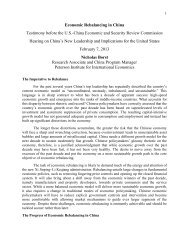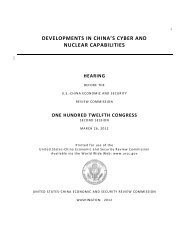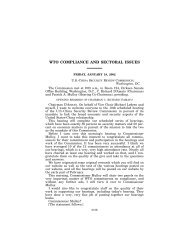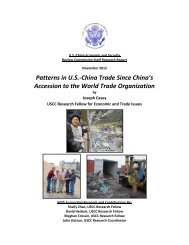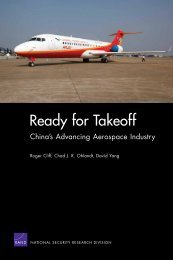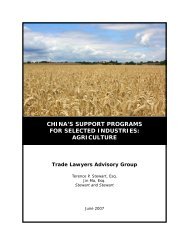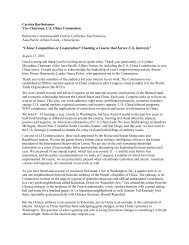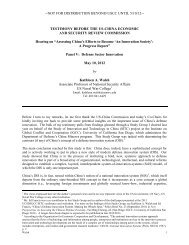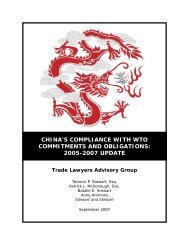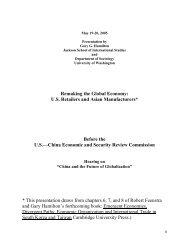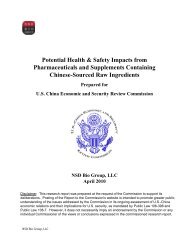- Page 1 and 2: 12011REPORT TO CONGRESSof theU.S.-C
- Page 3 and 4: U.S.-CHINA ECONOMIC AND SECURITY RE
- Page 5 and 6: dkrause on DSKHT7XVN1PROD with $$_J
- Page 7 and 8: CONTENTSPageTRANSMITTAL LETTER TO T
- Page 9 and 10: dkrause on DSKHT7XVN1PROD with $$_J
- Page 11 and 12: dkrause on DSKHT7XVN1PROD with $$_J
- Page 13 and 14: dkrause on DSKHT7XVN1PROD with $$_J
- Page 15 and 16: dkrause on DSKHT7XVN1PROD with $$_J
- Page 17 and 18: dkrause on DSKHT7XVN1PROD with $$_J
- Page 19: dkrause on DSKHT7XVN1PROD with $$_J
- Page 23 and 24: dkrause on DSKHT7XVN1PROD with $$_J
- Page 25 and 26: dkrause on DSKHT7XVN1PROD with $$_J
- Page 27 and 28: dkrause on DSKHT7XVN1PROD with $$_J
- Page 29 and 30: dkrause on DSKHT7XVN1PROD with $$_J
- Page 31 and 32: 23Figure 1:China’s Share of the U
- Page 33 and 34: 25The weakness in U.S. exports of a
- Page 35 and 36: dkrause on DSKHT7XVN1PROD with $$_J
- Page 37 and 38: dkrause on DSKHT7XVN1PROD with $$_J
- Page 39 and 40: 31Table 3:RMB Bond Issuances by Mul
- Page 41 and 42: dkrause on DSKHT7XVN1PROD with $$_J
- Page 43 and 44: 35of bilateral negotiations under t
- Page 45 and 46: 37Stonewalling the WTO: A Case Stud
- Page 47 and 48: 39that China’s existing system of
- Page 49 and 50: 41now. Because the structures of th
- Page 51 and 52: 43How Big Is China’s State Sector
- Page 53 and 54: 45Fortune Global 500, compared to j
- Page 55 and 56: 47panies are less profitable, after
- Page 57 and 58: 49erate primarily within state-cont
- Page 59 and 60: dkrause on DSKHT7XVN1PROD with $$_J
- Page 61 and 62: dkrause on DSKHT7XVN1PROD with $$_J
- Page 63 and 64: dkrause on DSKHT7XVN1PROD with $$_J
- Page 65 and 66: 57Figure 1: Chinese FDI Stock in th
- Page 67 and 68: dkrause on DSKHT7XVN1PROD with $$_J
- Page 69 and 70: dkrause on DSKHT7XVN1PROD with $$_J
- Page 71 and 72:
63U.S. firms with sensitive technol
- Page 73 and 74:
65Addendum I: SASAC Companies, Larg
- Page 75 and 76:
67Addendum I: SASAC Companies, Larg
- Page 77 and 78:
69dkrause on DSKHT7XVN1PROD with $$
- Page 79 and 80:
71January 2010, the heads of 19 U.S
- Page 81 and 82:
dkrause on DSKHT7XVN1PROD with $$_J
- Page 83 and 84:
dkrause on DSKHT7XVN1PROD with $$_J
- Page 85 and 86:
77cause Beijing had sought to exclu
- Page 87 and 88:
dkrause on DSKHT7XVN1PROD with $$_J
- Page 89 and 90:
81China in Search of Western Techno
- Page 91 and 92:
83scious policy seeking to drive Ch
- Page 93 and 94:
dkrause on DSKHT7XVN1PROD with $$_J
- Page 95 and 96:
dkrause on DSKHT7XVN1PROD with $$_J
- Page 97 and 98:
89Like previous plans, the 12th Fiv
- Page 99 and 100:
dkrause on DSKHT7XVN1PROD with $$_J
- Page 101 and 102:
dkrause on DSKHT7XVN1PROD with $$_J
- Page 103 and 104:
95Consultative Conference National
- Page 105 and 106:
dkrause on DSKHT7XVN1PROD with $$_J
- Page 107 and 108:
99panies account[ed] for fully 7 pe
- Page 109 and 110:
101Dr. Shih has testified before th
- Page 111 and 112:
103ment subsidies, which in turn wi
- Page 113 and 114:
105Addendum II: Figures 1-2Figure 1
- Page 115 and 116:
dkrause on DSKHT7XVN1PROD with $$_J
- Page 117 and 118:
dkrause on DSKHT7XVN1PROD with $$_J
- Page 119 and 120:
dkrause on DSKHT7XVN1PROD with $$_J
- Page 121 and 122:
113drivers cited increased fuel pri
- Page 123 and 124:
dkrause on DSKHT7XVN1PROD with $$_J
- Page 125 and 126:
dkrause on DSKHT7XVN1PROD with $$_J
- Page 127 and 128:
dkrause on DSKHT7XVN1PROD with $$_J
- Page 129 and 130:
dkrause on DSKHT7XVN1PROD with $$_J
- Page 131 and 132:
123uating from college and hoping t
- Page 133 and 134:
dkrause on DSKHT7XVN1PROD with $$_J
- Page 135 and 136:
dkrause on DSKHT7XVN1PROD with $$_J
- Page 137 and 138:
dkrause on DSKHT7XVN1PROD with $$_J
- Page 139 and 140:
131unfairly or unjustifiably harm U
- Page 141 and 142:
dkrause on DSKHT7XVN1PROD with $$_J
- Page 143 and 144:
dkrause on DSKHT7XVN1PROD with $$_J
- Page 145 and 146:
dkrause on DSKHT7XVN1PROD with $$_J
- Page 147 and 148:
dkrause on DSKHT7XVN1PROD with $$_J
- Page 149 and 150:
dkrause on DSKHT7XVN1PROD with $$_J
- Page 151 and 152:
dkrause on DSKHT7XVN1PROD with $$_J
- Page 153 and 154:
dkrause on DSKHT7XVN1PROD with $$_J
- Page 155 and 156:
dkrause on DSKHT7XVN1PROD with $$_J
- Page 157 and 158:
dkrause on DSKHT7XVN1PROD with $$_J
- Page 159 and 160:
dkrause on DSKHT7XVN1PROD with $$_J
- Page 161 and 162:
dkrause on DSKHT7XVN1PROD with $$_J
- Page 163 and 164:
dkrause on DSKHT7XVN1PROD with $$_J
- Page 165 and 166:
dkrause on DSKHT7XVN1PROD with $$_J
- Page 167 and 168:
dkrause on DSKHT7XVN1PROD with $$_J
- Page 169 and 170:
161gress, the DoD noted that China
- Page 171 and 172:
dkrause on DSKHT7XVN1PROD with $$_J
- Page 173 and 174:
165eral U.S. military policies, inc
- Page 175 and 176:
167Figure 1:Territorial Disputes in
- Page 177 and 178:
dkrause on DSKHT7XVN1PROD with $$_J
- Page 179 and 180:
171provides guidelines for dealing
- Page 181 and 182:
173network exploitations to facilit
- Page 183 and 184:
dkrause on DSKHT7XVN1PROD with $$_J
- Page 185 and 186:
dkrause on DSKHT7XVN1PROD with $$_J
- Page 187 and 188:
dkrause on DSKHT7XVN1PROD with $$_J
- Page 189 and 190:
181ligence, surveillance, and recon
- Page 191 and 192:
dkrause on DSKHT7XVN1PROD with $$_J
- Page 193 and 194:
dkrause on DSKHT7XVN1PROD with $$_J
- Page 195 and 196:
187Therefore, the PLA maintains the
- Page 197 and 198:
189Of import, the PLA’s geographi
- Page 199 and 200:
dkrause on DSKHT7XVN1PROD with $$_J
- Page 201 and 202:
dkrause on DSKHT7XVN1PROD with $$_J
- Page 203 and 204:
dkrause on DSKHT7XVN1PROD with $$_J
- Page 205 and 206:
197ther moves toward independence,
- Page 207 and 208:
199trates the depth of China’s sp
- Page 209 and 210:
201Figure 2:Representation of Beido
- Page 211 and 212:
dkrause on DSKHT7XVN1PROD with $$_J
- Page 213 and 214:
205ganization, modeled on the Europ
- Page 215 and 216:
207China’s leadership also places
- Page 217 and 218:
dkrause on DSKHT7XVN1PROD with $$_J
- Page 219 and 220:
211[General Armaments Department] p
- Page 221 and 222:
213Table 2: Select Chinese Satellit
- Page 223 and 224:
215weapons or coorbital satellite w
- Page 225 and 226:
217Malicious Cyber ActivitiesDirect
- Page 227 and 228:
dkrause on DSKHT7XVN1PROD with $$_J
- Page 229 and 230:
RECOMMENDATIONSChina’s ‘‘Area
- Page 231 and 232:
dkrause on DSKHT7XVN1PROD with $$_J
- Page 233 and 234:
dkrause on DSKHT7XVN1PROD with $$_J
- Page 235 and 236:
dkrause on DSKHT7XVN1PROD with $$_J
- Page 237 and 238:
dkrause on DSKHT7XVN1PROD with $$_J
- Page 239 and 240:
dkrause on DSKHT7XVN1PROD with $$_J
- Page 241 and 242:
dkrause on DSKHT7XVN1PROD with $$_J
- Page 243 and 244:
dkrause on DSKHT7XVN1PROD with $$_J
- Page 245 and 246:
dkrause on DSKHT7XVN1PROD with $$_J
- Page 247 and 248:
239320. Chang Xianqi, Military Astr
- Page 249 and 250:
dkrause on DSKHT7XVN1PROD with $$_J
- Page 251 and 252:
243woman Jiang Yu simply expressed
- Page 253 and 254:
245Table 1:Timeline of Sino-North K
- Page 255 and 256:
dkrause on DSKHT7XVN1PROD with $$_J
- Page 257 and 258:
249China also provides economic sup
- Page 259 and 260:
251economic and social strains woul
- Page 261 and 262:
dkrause on DSKHT7XVN1PROD with $$_J
- Page 263 and 264:
255Iran’s South Pars Gas Field af
- Page 265 and 266:
257When asked by Commissioners abou
- Page 267 and 268:
dkrause on DSKHT7XVN1PROD with $$_J
- Page 269 and 270:
dkrause on DSKHT7XVN1PROD with $$_J
- Page 271 and 272:
dkrause on DSKHT7XVN1PROD with $$_J
- Page 273 and 274:
dkrause on DSKHT7XVN1PROD with $$_J
- Page 275 and 276:
dkrause on DSKHT7XVN1PROD with $$_J
- Page 277 and 278:
dkrause on DSKHT7XVN1PROD with $$_J
- Page 279 and 280:
dkrause on DSKHT7XVN1PROD with $$_J
- Page 281 and 282:
dkrause on DSKHT7XVN1PROD with $$_J
- Page 283 and 284:
dkrause on DSKHT7XVN1PROD with $$_J
- Page 285 and 286:
dkrause on DSKHT7XVN1PROD with $$_J
- Page 287 and 288:
dkrause on DSKHT7XVN1PROD with $$_J
- Page 289 and 290:
281trade, and dispute settlement. 2
- Page 291 and 292:
dkrause on DSKHT7XVN1PROD with $$_J
- Page 293 and 294:
dkrause on DSKHT7XVN1PROD with $$_J
- Page 295 and 296:
287of Request to the United States
- Page 297 and 298:
289fense, since its current fleet o
- Page 299 and 300:
dkrause on DSKHT7XVN1PROD with $$_J
- Page 301 and 302:
dkrause on DSKHT7XVN1PROD with $$_J
- Page 303 and 304:
dkrause on DSKHT7XVN1PROD with $$_J
- Page 305 and 306:
dkrause on DSKHT7XVN1PROD with $$_J
- Page 307 and 308:
dkrause on DSKHT7XVN1PROD with $$_J
- Page 309 and 310:
dkrause on DSKHT7XVN1PROD with $$_J
- Page 311 and 312:
dkrause on DSKHT7XVN1PROD with $$_J
- Page 313 and 314:
dkrause on DSKHT7XVN1PROD with $$_J
- Page 315 and 316:
dkrause on DSKHT7XVN1PROD with $$_J
- Page 317 and 318:
dkrause on DSKHT7XVN1PROD with $$_J
- Page 319 and 320:
dkrause on DSKHT7XVN1PROD with $$_J
- Page 321 and 322:
dkrause on DSKHT7XVN1PROD with $$_J
- Page 323 and 324:
dkrause on DSKHT7XVN1PROD with $$_J
- Page 325 and 326:
dkrause on DSKHT7XVN1PROD with $$_J
- Page 327 and 328:
3190aRCRD&ss=Hong+Kong&s=News; Pete
- Page 329 and 330:
dkrause on DSKHT7XVN1PROD with $$_J
- Page 331 and 332:
323mation Office. Day-to-day superv
- Page 333 and 334:
dkrause on DSKHT7XVN1PROD with $$_J
- Page 335 and 336:
327Although the slogans change over
- Page 337 and 338:
dkrause on DSKHT7XVN1PROD with $$_J
- Page 339 and 340:
dkrause on DSKHT7XVN1PROD with $$_J
- Page 341 and 342:
dkrause on DSKHT7XVN1PROD with $$_J
- Page 343 and 344:
335What Constitutes a ‘‘Core In
- Page 345 and 346:
dkrause on DSKHT7XVN1PROD with $$_J
- Page 347 and 348:
339Selected CAIFC/CPD Track Two Exc
- Page 349 and 350:
341disseminated through diplomatic
- Page 351 and 352:
dkrause on DSKHT7XVN1PROD with $$_J
- Page 353 and 354:
dkrause on DSKHT7XVN1PROD with $$_J
- Page 355 and 356:
dkrause on DSKHT7XVN1PROD with $$_J
- Page 357 and 358:
dkrause on DSKHT7XVN1PROD with $$_J
- Page 359 and 360:
dkrause on DSKHT7XVN1PROD with $$_J
- Page 361 and 362:
dkrause on DSKHT7XVN1PROD with $$_J
- Page 363 and 364:
dkrause on DSKHT7XVN1PROD with $$_J
- Page 365 and 366:
dkrause on DSKHT7XVN1PROD with $$_J
- Page 367 and 368:
dkrause on DSKHT7XVN1PROD with $$_J
- Page 369 and 370:
dkrause on DSKHT7XVN1PROD with $$_J
- Page 371 and 372:
dkrause on DSKHT7XVN1PROD with $$_J
- Page 373 and 374:
dkrause on DSKHT7XVN1PROD with $$_J
- Page 375 and 376:
dkrause on DSKHT7XVN1PROD with $$_J
- Page 377 and 378:
dkrause on DSKHT7XVN1PROD with $$_J
- Page 379 and 380:
dkrause on DSKHT7XVN1PROD with $$_J
- Page 381 and 382:
dkrause on DSKHT7XVN1PROD with $$_J
- Page 383 and 384:
375ecutive Schedule under section 5
- Page 385 and 386:
dkrause on DSKHT7XVN1PROD with $$_J
- Page 387 and 388:
dkrause on DSKHT7XVN1PROD with $$_J
- Page 389 and 390:
dkrause on DSKHT7XVN1PROD with $$_J
- Page 391 and 392:
dkrause on DSKHT7XVN1PROD with $$_J
- Page 393 and 394:
dkrause on DSKHT7XVN1PROD with $$_J
- Page 395 and 396:
APPENDIX IIIPUBLIC HEARINGS OF THE
- Page 397 and 398:
dkrause on DSKHT7XVN1PROD with $$_J
- Page 399 and 400:
APPENDIX IIIALIST OF WITNESSES TEST
- Page 401 and 402:
393Alphabetical Listing of Panelist
- Page 403 and 404:
dkrause on DSKHT7XVN1PROD with $$_J
- Page 405 and 406:
397In TaiwanU.S. Government• Amer
- Page 407 and 408:
APPENDIX VLIST OF RESEARCH MATERIAL
- Page 409 and 410:
401The National Security Implicatio
- Page 411 and 412:
APPENDIX VIACRONYMS AND ABBREVIATIO
- Page 413 and 414:
dkrause on DSKHT7XVN1PROD with $$_J



